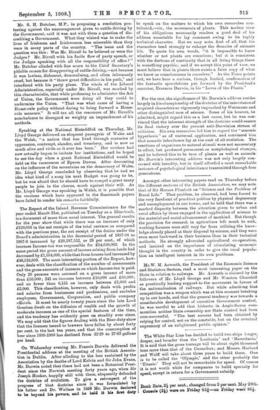On Wednesday evening Mr. Francis Darwin delivered the Presidential address
at the meeting of the British Associa- tion in Dublin. After alluding to the loss sustained by the Association by the deaths of Lord Kelvin and Sir John Evans, Mr. Darwin noted that there had not been a Botanical Presi- dent since the Norwich meeting forty years ago, when Sir Joseph Hooker, happily still with them, eloquently defended the doctrine of evolution. To give a retrospect of the progress of that doctrine since it was formulated by his father and Dr. Wallace in 1868 Mr. Darwin declared to be beyond his powers, and he held it his iirst duty to speak on the matters to which his own researches con- tributed,—viz., the movements of plants. This modest view of his obligations necessarily renders a good deal of his address unsuitable for lay comment owing to its highly technical character. But we may note, first of all, that his researches tend strongly to enlarge the domains of animate life. To quote his own words, "it is impossible to know whether or not plants are conscious; but it is consistent with the doctrine of continuity that in all living things there is something psychic; and if we accept this point of view, we must believe that in plants there exists a faint copy of what we know as consciousness in ourselves." As the Times points out, we have here a curious, though limited, confirmation of the fantastic speculations put forward by the President's ancestor, Erasmus Darwin, in his " Loves of the Plants."






































 Previous page
Previous page